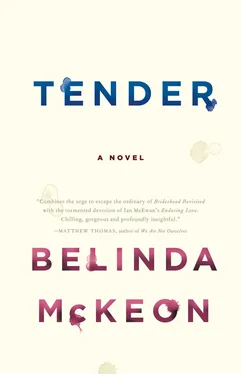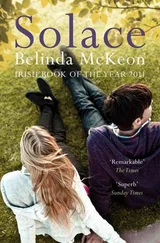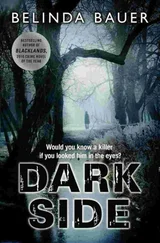She stared at him. The collar of his denim shirt, fluttering slightly in the breeze. The gray in his beard. A freckle high on his cheek, maybe a mole; he should get that checked. But that was not something she should even be noticing; that was not something it was her place to notice.
“Well, I’m sorry,” she said again, feeling the need to insist on it.
He shook his head. “You don’t need to tell me that, Catherine. That’s your business. The being sorry, I mean. That’s part of your life. I don’t mean anything harsh by that. I don’t mean that it’s worthless or anything, your being sorry, or your apology, or sorrow, or however you’d put it. I just mean, it’s yours.”
“Yeah,” Catherine said, her voice hollow. She felt she was being fobbed off, somehow; she felt as if, all over again, she was being refused.
“I have my own things,” he said, and he gave a short laugh. “Fuckin’ plenty of them.”
He sighed. “That’s the walkway,” he said, pointing up ahead. A bright green lane for cyclists and pedestrians arched across the river, pinned at two points by tall, thin towers at the top of which sentry windows were visible. It was a strange structure, looking like something out of a graphic novel against the clouds, against this city which seemed, dourly, to have turned its back to them. As they watched, a cyclist whizzed down the platform and onto the island path, disappearing behind the scraggy trees.
“People come out here to get a bit of headspace,” James said. “It’s a weird old spot.” He pointed to the city. “Look, there’s the Chrysler, look, peeking out between those two lumps of things. Can you see it?”
She squinted. “I think so.”
“Well, you wouldn’t mistake the Chrysler. It’s beautiful. Where are you staying?”
“The Standard.”
“Oh-ho,” he said, gleefully. “Sex with Michael Fassbender up against the plate-glass windows?”
Catherine made a face. “I wouldn’t complain.”
“Well, you’re a free agent now,” he said, and he took her arm. The touch of him, the solidness of him; for a moment, Catherine could not breathe. He swayed into her, and she swayed against him, and then they were in step; then they had their rhythm. The path, and the yellow flowers, and the grass verging scruffy against the gravel, and the water’s edge, and the bridge was coming, and the bridge would take him away.
“You trusted me, and I don’t think I did the right thing with that, James,” Catherine said. “I don’t know why I did what I did with it.”
He shrugged; she felt it, against the arm he was holding, as a tug. “I wasn’t that good to you, either.”
“Not deliberately.”
“Neither of us was acting deliberately. Maybe that was the problem.”
“Maybe,” she said doubtfully.
“We were kids, Catherine. We were wains, as my mother would say. It’s all a long time ago now.”
“Not that long.”
“Are you joking?” he said, and he pointed to his face. “Look at these wrinkles.” He made a show of examining the skin around her eyes. “You’re not doing too badly, actually. Fuck you anyway.”
She burst out laughing; he was laughing too. It was a performance, of course; a performance with which he could steer them out of dicey territory. It was what he had always done, and he was still doing it now, only now he was so much better at it — Catherine saw it, the smoothness, the quickness, the practice he had had. He stuck out his bottom lip now, in a mock sulk, and pretended to glower at her skin again, and she laughed again, like he wanted her to, like he needed her to do.
“You’re terrible, Muriel,” she said, in an Australian accent.
“I’m terrible, Muriel,” he said, in exactly the same twang. He gripped her arm very tightly for a moment, and then he let it go.
At the entrance to the walkway, they hugged goodbye; not a long hug, but not a short hug, either, and as he stepped back away from her, James sighed. Nothing had been said about keeping in touch, or about meeting up again during the rest of her stay here; they had not exchanged email addresses or phone numbers, had not said anything, even, about finding each other on Facebook. Catherine would have felt ridiculous suggesting this, even though it seemed to be staring them in the face as something obvious now, something natural; they had, after all, mentioned it several times. But she could not do it; she felt that the move, if it was to be made, was up to him. And what was it anyway, only staged photos and inane ramblings? They were better off without it, probably. They were better off just bumping into one another whenever the world sent them one another’s way.
“Listen,” James said now, and he glanced towards the city. “This show of mine, Catherine. In the gallery.”
“Oh, I can’t,” Catherine said. “I thought I mentioned — I’m flying back to London on Monday night.”
“I know, I know, and the opening’s not till Tuesday,” he said. “But if you wanted — if you were able — I mentioned to Meghan there as we were leaving that I’d like for you to be able to call in for a private viewing on Monday during the day sometime, and could she arrange to have someone there.”
“Oh?”
“Yeah. It’ll be mostly installed by then.”
“And will you be there?”
“Oh, no,” he said, flinching as though he had been stung. “I couldn’t — I can barely stand to look at them when they’re up myself, never mind to watch someone else looking at them.”
“Oh, sure, sure.”
“But I’d like you to see them. Just, you know. To see.”
“Sure,” Catherine nodded, and, feeling the need to make this somehow businesslike, she took her BlackBerry out of her jacket pocket. She toggled the screen randomly; the weather icon was what opened up. “What time?” she said, her eyes on the screen. “Ten thirty or eleven?”
“It’s up to you,” James said. “They’ll be there all day. Just go when it suits you. If it suits you.”
“Of course it suits me. I’m really looking forward to it.”
“OK,” James said, and he smiled at her.
“Thanks, James.”
“I’d better go,” he said, pointing towards the walkway as though it was something waiting for him. “I’ll chat to you?”
“I’ll chat to you,” Catherine nodded, and she watched him walk away. And when she walked away, she looked back at him, at his form going over the strange green bridge, his rucksack on his back, his arms swinging, like a tourist going to see what he could see.
But he was not the tourist, of course. The tourist was her.
* * *
His name was already printed on the frosted glass of the gallery window, low down, to the left of the entrance: James Flynn, and the name of the show, Twenty of You . Catherine pressed the buzzer and waited. The street was almost eerily quiet; on a Monday, the galleries were all closed to the public. The door opened a crack, and a young woman peered out; seeing Catherine, she smiled and ushered her in. She was Alice, she said, and James had called that morning to let her know that Catherine would be coming to see the work — could she get Catherine anything: coffee, water, anything?
“I’m fine, thanks,” Catherine said, glancing around the space; they were in the reception area, where a large desk — presumably Alice’s — faced a wall of catalogues of James’s work; the large hardbacks of the last two shows at Greene were there, along with the magazine-bound editions he had made with McGinley and the others, and the softbound catalogue from the first Lewis show. Catherine moved towards them, but then realized that the girl — Alice — was holding something out to her; a list, on an A4 sheet, of the works in the new show.
Читать дальше












